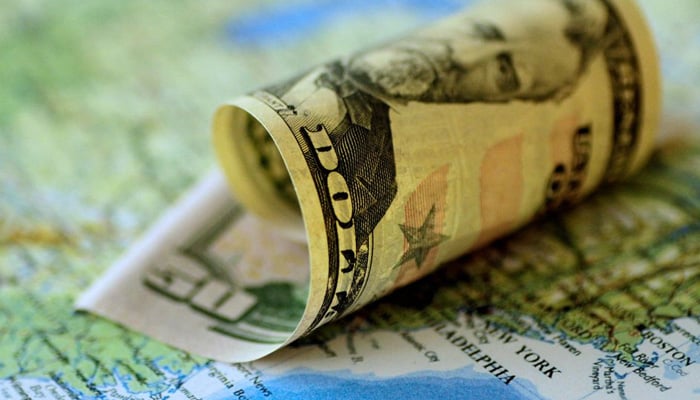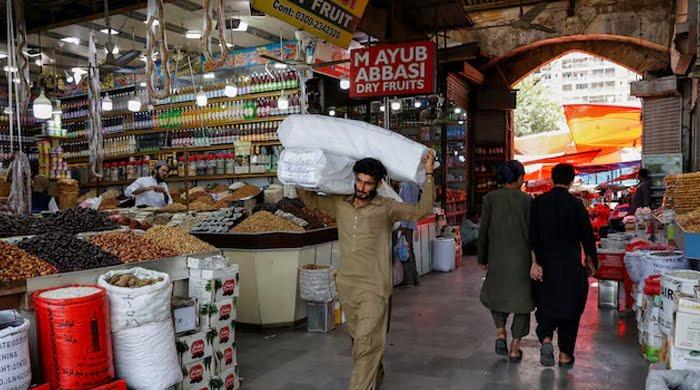Where are we with ‘geo-strategic to geo-economics'
Pakistan continues to be an “ailing economy” with 22 International Monetary Fund (IMF) packages since 1980
July 27, 2022

A year ago, the Pakistani state and government launched a new security paradigm to shift the country's focus from "geo-strategic to geo-economics".
Unfortunately, despite the response from multilateral agencies and friendly neighbours, the new security plan has gone off to an undesirable start.
On July 21, the federal cabinet passed an ordinance to sell precious national assets, bypassing relevant laws to meet foreign exchange needs.
Pakistan continues to be an “ailing economy” with 22 International Monetary Fund (IMF) packages since 1980. In the global financial community, Argentina, Pakistan, and Egypt are branded as permanent IMF clients.
In the last month of the PML-N government in 2018, the then-finance minister had said Pakistan may have to go to IMF if the trade deficit is not controlled.
The PTI government remained under an IMF programme despite the placement of deposits and deferred oil payments from China, Saudi Arabia, and the United Arab Emirates (UAE).
Unfortunately, we face a similar crisis again and have negotiated another IMF programme.
There is now talk of taking equity by friendly governments in major Pakistani commercial organisations to revive them and our economy. Unfortunately, different stakeholders in Pakistan are not looking at the larger picture to stem this decline.
Due to the global economic slowdown caused by the Ukraine war and the coronavirus pandemic, the challenges for Pakistan have increased manifold.
The present political unease has ruined market sentiment and the rupee has lost 23% during this year so far.
Our local and foreign debt continues to pile up and is now over 75% of the GDP. One of the main parties is not in the Parliament and even if new elections are agreed upon, there is uncertainty around how the caretakers will be appointed.
The appointment of caretakers is likely to end up with the Election Commission of Pakistan (ECP), in which the PTI has shown an utter lack of confidence.
Major political parties need to bring down the temperature, shun “annihilistic politics”, and take fresh guard. If they do not settle matters, they will lose the initiative to get Pakistan out of this crisis.
The country's biggest political parties, despite the worst acrimony between them, need to open communication channels to settle a new election date and mechanism.
All other stakeholders shall play a positive role in helping political parties reach consensus and assure them of neutrality and cooperation. Pakistan direly needs political continuity and stability over an extended period, i.e. at least 15 years.
A fair and capable regulator ensures the success of any sector and in this case, it’s the office of the chief election commissioner (CEC). The CEC and its office and machinery should undertake all possible actions to win the confidence of political parties.
The acting governor of State Bank, in a podcast last week, tried to assure the market about Pakistan's ability to service its nearly $35 billion liabilities in the ongoing financial year.
However, political stability and the confidence of multilateral agencies and our strong friends are urgently needed to meet our financial obligations and improve the value of the rupee.
Political parties must focus on solutions to revive the economy and achieve self-reliance in their upcoming election manifestos. Pakistan has a three trillion tax revenue shortage and needs an additional $15-20 billion in foreign exchange.
Both shortcomings can be overcome with higher taxes by finishing evasion in retail and agriculture and additional forex can be earned through higher exports and remittances. We have over 300,000 MWs of cheap clean energy potential and can easily overcome our energy crisis.
After 40 years of American wars in the Afghan and the Middle Eastern corridor, there is an emerging consensus in the region toward peace and development.
Pakistan only needs to put up a better political and economic show and its good friends in the region will love to see it stabilise and play a stronger role in regional development.
This is the best recipe for achieving the targets in the shift from geo-strategic to geo-economics and winning the confidence of our own people and our good friends in the region.











